
The economy of Afghanistan is listed as the 124th largest in the world in terms of nominal gross domestic product (GDP), and 102nd largest in the world in terms of purchasing power parity (PPP). With a population of around 41 million people, Afghanistan's GDP (nominal) stands at $14.58 billion as of 2021, amounting to a GDP per capita of $363.7. Its annual exports exceed $2 billion, with agricultural, mineral and textile products accounting for 94% of total exports. The nation's total external debt is $1.4 billion as of 2022.
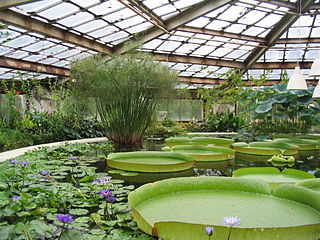
A greenhouse is a structure that is designed to regulate the temperature and humidity of the environment inside. There are different types of greenhouses, but they all have large areas covered with transparent materials that let sunlight pass and block it as heat. The most common materials used in modern greenhouses for walls and roofs are rigid plastic made of polycarbonate, plastic film made of polyethylene, or glass panes. When the inside of a greenhouse is exposed to sunlight, the temperature increases, providing a sheltered environment for plants to grow even in cold weather.
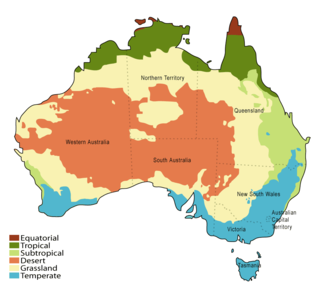
Although Australia is mostly arid, the nation is a major agricultural producer and exporter, with around 421,000 people employed in agriculture, forestry and fishing as of 2023. Agriculture's farm gate output was $100 billion a year for a 5.7% share of GDP in 2023. Farmers and grazers own 135,997 farms, covering 61% of Australia's landmass. Across the country, there is a mix of irrigation and dry-land farming. The success of Australia in becoming a major agricultural power despite the odds is facilitated by its policies of long-term visions and promotion of agricultural reforms that greatly increased the country's agricultural industry.

John Lindsay Falvey is an Australian-born international R&D specialist and writes on topics concerning agricultural science and philosophy, religion, international development and spiritual development. He has been Chair of the Board of Trustees the CGIAR Consortium member, the International Livestock Research Institute from 2013, and is a life member of Clare Hall at the University of Cambridge. He continues as an Honorary Professor, having retired as a professor at the University of Melbourne where he was Chair of Agriculture, Dean of Land and Food Resources and Dean of Agriculture, Forestry and Horticulture.

Agriculture in Iran is underdeveloped. While one-third of Iran's total surface area is suitable for farming, due to poor soil and inadequate water distribution, most of it is not cultivated. Less than one-third of the land planted with crops, orchards and vineyards is irrigated; the rest is devoted to dryland farming. The western and northwestern portions of the country have the most fertile soil. Iran's food security index stands at around 96 percent.
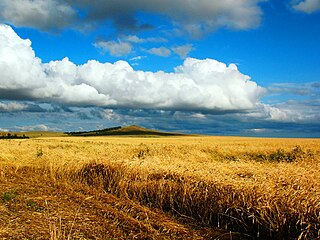
Agriculture in Kazakhstan remains a small scale sector of Kazakhstan's economy. Agriculture's contribution to the GDP is under 10% – it was recorded as 6.7%, and as occupying only 20% of labor. At the same time, more than 70% of its land is occupied in crops and animal husbandry. Kazakhstan has the highest cropland area per capita in the world, followed by Australia and Canada. Compared to North America, a relatively small percentage of land is used for crops, with the percentage being higher in the north of the country. 70% of the agricultural land is permanent pastureland.

Agriculture in South Korea is a sector of the economy of South Korea. Korean agriculture is the basic industry of the Korean economy, consisting of farming, animal husbandry, forestry and fishing. At the time of its founding, Korea was a typical agricultural country, with more than 80% of the population engaged in agricultural production. After land reform under the Lee Seung-man administration, economic revitalization under the Park Chung-hee military government and the wave of world trade liberalization that began in the 1980s, Korean agriculture has undergone dramatic changes. Through the Green Revolution, Korea became self-sufficient in rice, the staple food, in 1978, and in 1996, Korea became the first Asian country after Japan to mechanize its agriculture with fine-grained cultivation. The development of Korean agriculture has also led to the development of agriculture-related industries such as fertilizer, agricultural machinery and seed.
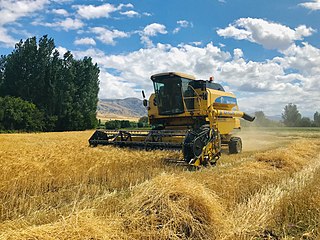
Agriculture is still an important sector of Turkey's economy, and the country is one of the world's top ten agricultural producers. Wheat, sugar beet, milk, poultry, cotton, vegetables and fruit are major products; and Turkey is the world's largest grower of hazelnuts, apricots, and oregano.

Benin is predominantly a rural society, and agriculture in Benin supports more than 70% of the population. Agriculture contributes around 35% of the country's gross domestic product (GDP) and 80% of export income. While the Government of Benin (GOB) aims to diversify its agricultural production, Benin remains underdeveloped, and its economy is underpinned by subsistence agriculture. Approximately 93% of total agricultural production goes into food production. The proportion of the population living in poverty is about 35.2%, with more rural households in poverty (38.4%) than urban households (29.8%). 36% of households depend solely upon agricultural (crop) production for income, and another 30% depend on crop production, livestock, or fishing for income.

Agriculture in Lebanon is the third most productive sector in the country after the tertiary and industrial sectors. It contributes 3.1% of GDP and 8 percent of the effective labor force. The sector includes an informal Syrian labor and is dependent on foreign labor for its productivity. Main crops include cereals, fruits and vegetables, olives, grapes, and tobacco, along with sheep and goat herding. Mineral resources are limited and are only exploited for domestic consumption. Lebanon, which has a variety of agricultural lands, from the interior plateau of the Beqaa Valley to the narrow valleys leading downward to the sea, enables farmers to grow both European and tropical crops. Tobacco and figs are grown in the south, citrus fruits and bananas along the coast, olives in the north and around the Shouf Mountains, and fruits and vegetables in the Beqaa Valley. More exotic crops include avocados, grown near Byblos, and hashish. Although the country benefits from favorable farming conditions and diverse microclimates, it relies on food imports, which make up 80% of its consumption.

The use of biofuels varies by region. The world leaders in biofuel development and use are Brazil, United States, France, Sweden and Germany.

In New Zealand, agriculture is the largest sector of the tradable economy. The country exported NZ$46.4 billion worth of agricultural products in the 12 months to June 2019, 79.6% of the country's total exported goods. The agriculture, forestry and fisheries sector directly contributed $12.653 billion of the national GDP in the 12 months to September 2020, and employed 143,000 people, 5.9% of New Zealand's workforce, as of the 2018 census.
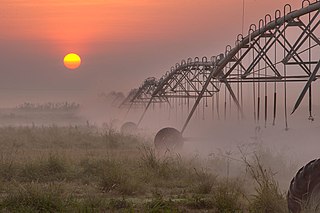
Agriculture in Qatar is inherently limited in scope due to the harsh climate and lack of arable land. In spite of this, small-scale farming, nomadic herding, and fishing were the predominant means of subsistence in the region prior to the 20th century. Sea-based activities such as pearling and fishing served as the primary sources of income for Qataris until the commencement of oil drilling in 1939.

Agriculture in Saudi Arabia is focused on the export of dates, dairy products, eggs, fish, poultry, fruits, vegetables, and flowers to markets around the world after achieving self-sufficiency in the production of such products. The government of Saudi Arabia is heavily involved in the agriculture industry and subsidizing corporate farming and the Ministry of Environment, Water and Agriculture is primarily responsible for agricultural policy. In the private sector, farmers receive long-term interest-free government loans and low-cost water, fuel, electricity, and duty-free imports of raw materials and machinery.

Legend Holdings Corporation (联想控股股份有限公司) is a Chinese investment holding company with interests in finance, real estate, and information technology, and the controlling shareholder of its better-known associate company, the Lenovo Group. Formed by the Chinese Academy of Sciences, Lenovo was originally Legend Computer, until the English name was changed in 2004. Its Chinese name however remains the same, 联想.

Agriculture in Liberia is a major sector of the country's economy worth 38.8% of GDP, employing more than 70% of the population and providing a valuable export for one of the world's least developed countries. Liberia has a climate favourable to farming, vast forests, and an abundance of water, yet low yields mean that over half of foodstuffs are imported, with net agricultural trade at -$73.12 million in 2010. This was dismissed as a "misconception" by Liberia's Minister of Agriculture.
Sundrop Farms is a developer, owner and operator of high tech greenhouse facilities which grow crops using methods which reduce reliance on finite natural resources when compared to conventional greenhouse production. Sundrop Farms opened its first pilot facility in Port Augusta, South Australia, in 2010. This facility was originally designed as a Seawater Greenhouse. However, significant technology changes led to the Sundrop System, and the dissolution of the joint venture with Seawater Greenhouse Ltd. Sundrop Farms commissioned an expanded 20 ha facility south of Port Augusta in 2016. Sundrop Farms has offices in London, UK and Adelaide, Australia. In October 2016, Sundrop Farms was operating greenhouses in Portugal, the United States and had another facility planned in Australia.

Agrivoltaics is the dual use of land for solar energy production and agriculture. The technique was first conceived by Adolf Goetzberger and Armin Zastrow in 1981.

The intensive agriculture of the province of Almeria, Spain, is a model of the utilization of highly technical means to achieve maximum economic yield based on the rational use of water, use of plastic greenhouses, highly technical training and high levels of employment of inputs, applied to the special characteristics of a particular environment. The greenhouses (invernaderos) are located between Motril and Almeria. The area of El Ejido is well known to be agriculturally productive.

Baladna is a Qatari agricultural company that raises livestock and produces dairy products. It is Qatar's largest locally-owned food and dairy producer, supplying over 95% of the country's fresh dairy products.



















